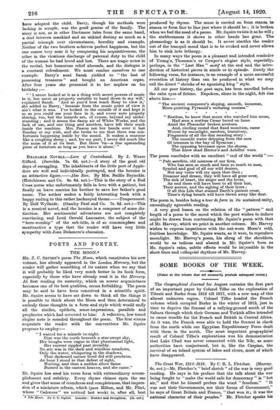POETS AND POETRY.
THE MOON.*
Ma. J. C. SQVIRE'S poem The Moon, which constitutes his new volume, has already appeared in the London Mercury, but the reader will gather something of its nature when we say that
it will probably be liked very much better in its book form, especially by those who have already read it in the Mercury. At first reading its austerity, which on nearer acquaintance becomes one of its best qualities, seems forbidding. The poem may be said to have been conceived in a scientific spirit. Mr. Squire seems to have sat down to think all the things it is possible to think about the Moon and then determined to
embody those thoughts in a form and style which would unify all the similes, epithets, sense-impressions, parallels and prophecies which had occurred to him: A reflective, low-toned elegiac note is sounded throughout the poem. The first stanza acquaints the reader with the conventions Mr. Squire proposes to employ:— " I waited for a miracle to-night.
Dim was the earth beneath a star-swept sky, Her boughs were vague in that phantasmal light, Her current rippled past invisibly. No stir was in the dark and windless meadows, Only the water, whispering in the shadows, That darkened nature lived did still proclaim. An hour I stood in that defeat of sight, Waiting, and then a sudden silver flame Burned in the eastern heaven, and she came."
Mr. Squire has used his verse form with extraordinary accom- plishment and subtlety. Every rhyme chimes upon the ear and gives that sense of roundness and completeness, that impres-
sion of a miniature refrain, which (pace Milton, and Mr. Flint, whose " Cadences " we noticed last week) is, after all, best
• The Moon. By J. C. Squire. London : Hodder and Stoughton. Po. not.1 produced by rhyme. The sense is carried on from stanza to
stanza or from line to line just where it should be ; it is broken when we feel the need of a pause. Mr. Squire twists it as he will ; the stubbornness it shows in other hands has gone. The phraseology is as it should be. It never startles the reader out of the tranquil mood that is to be evoked and never allows him to sink into lethargy.
In many ways the poem is a pleasant and intended reminder
of Young's, Thomson's or Cowper's elegiac style, especially. perhaps, in the " Last Man " motif at the, end and the intro- duction of historical pieces in simile or in episode. Surely the following verse, for instance, is an example of a more successful
evocation of history than can be produced in what we may call the direct " shrieks of an agonising king " style.
All our poor history, the poet says, has been unrolled before the calm eyes of Selene. Napoleon, alone in the night, felt rise above him:—
" The ancient conqueror's sloping, smooth, immense, Moon-pointing Pyramid's enduring courses."
" Restless, he knew that moon who watched him muse, Had seen a restless Caesar brood on fame Amid the Pharaohs' broken avenues.
And, circling round that fixed monition, came Woven by moonlight, random, transitory, Fragments of all the dim receding story : The moonlit water dripping from the oars Of triremes in the bay of Syracuse ; The opposing bivouacs upon the shores,
That knew dead Hector's and Achilles' wars.
The poem concludes with an excellent " end of the world " " Pale satellite, old mistress of our fires,
Who has seen so much and been so much to men, Symbol and goal of all our wild desires, Not any voice will cry upon thee then ; Dreamer and dream, they will have all gone over, The sick of heart, the singer and the lover, An end there will have been to all their lust, Their sorrow, and the sighing of their lyres ; O all this Life that stained Earth's patient crust, Time's dying breath will have blown away like dust.
The poem is, besides being a tour de force in its sustained unity, exceedingly agreeable reading.
A very good lesson on the relation of the " pattern " and length of a poem to the mood which the poet wishes to induce might be drawn from contrasting Mr. Squire's poem with that of Mr. Harvey, which we print in another column. Mr. Harvey wishes to express impatience with the out-worn Moon's cold, fruitless knowledge. Mr. Squire wants, as it were, to reproduce moonlight. Mr. Harvey's poem, his shrug of the shoulders, would be as tedious and absurd in Mr. Squire's form as Mr. Squire's calm, subtle effects would be impossible in the short lines and colloquial rhythms of Mr. Harvey.


































 Previous page
Previous page